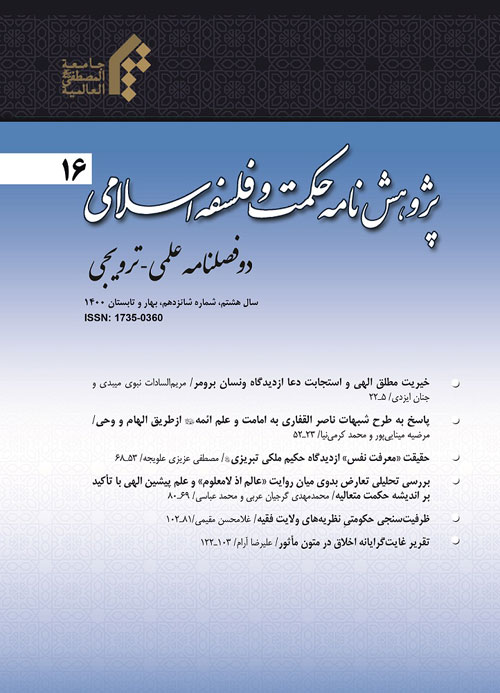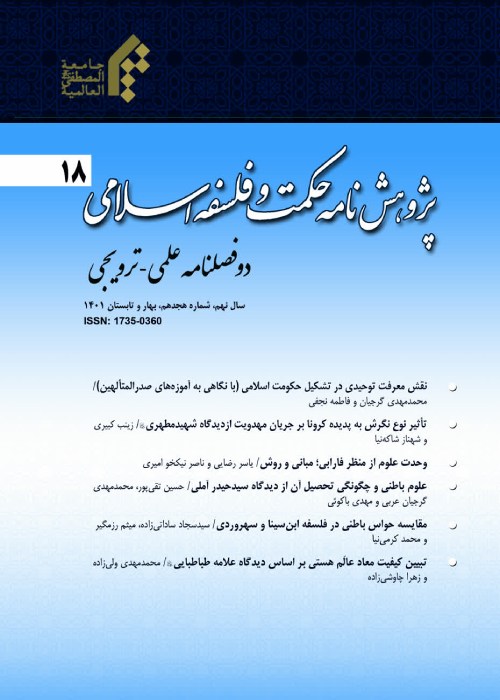فهرست مطالب

پژوهشنامه حکمت و فلسفه اسلامی
سال نهم شماره 16 (بهار و تابستان 1400)
- تاریخ انتشار: 1400/10/08
- تعداد عناوین: 6
-
-
صفحات 53-69
-
صفحات 81-103
-
صفحات 103-123
-
Pages 5-23
Praying to God might seem incompatible with God as the Absolute good. Having formulated that prayer is a personal relation between man and God, Vincent Brummer tried to resolve this incompatibility. Brummer has suggested three phases for the issue: firstly, prayer, in general, depends on God’s being the absolute good. Having corrected Aquinas’ view, Brummer goes of the view that God treats man as a “person”, rather than a “thing”. The second phase concerns God’s sovereignty which, he holds, is not unilateral, but bilateral and symmetrical. Divine sovereignty goes established only when embraced by human beings. The third phase is when somebody prays for another person i.e. intercession. In such a situation despite his prayer and anxiety for another person, the intercessor gets a new meaning of responsibility and concern which indeed provide for his own good. The main impression behind that intercession is the spiritual authority and therapeutic effect existing in beseeching God. The critical study and revision of Brummer’s ideas in an Islamic sphere affords the opportunity for comparative and richer studies on prayer in the Islamic and Shiite culture.
Keywords: prayer, absolute good, divine sovereignty, intercession, VincentBrummer -
Pages 23-53
The pivot on which all al-Qafari’s doubts and objections to Imam’s knowledge turn is the characteristics the Shiites hold for the Imams. Nasir al-Qafari aims to undermine the main pillar of the Shiite creed on Imamate. By his doubts, al-Qafari wants to say that Imams prove themselves superior to prophets; they are endowed with the source of revelation in order to have revealed knowledge. Accordingly, the knowledge with the Shiites is more than that with other Muslims, and this issue created division and hypocrisy among Muslims. He has made references to Usul alKafi in order to raise his doubts. In their research and through a descriptive-analytic method, the authors aim to examine Imam’s knowledge and to answer some of al-Qafari’s doubts. The outcome shows that Imams are the heirs of holy Prophet and follow his manner; they acquire their knowledge from three sources: the Qur’an and its exegesis, inheriting hadith from previous prophets and Imams and gifted knowledge.
Keywords: doubts, Nasir al-Qafari, Imamate, Imam’s knowledge, inspiration andrevelation -
Pages 53-69
The intuitive Self-knowledge is one fundamental discussion in practical mysticism. As per the principles of theoretical mysticism such as “personal unity of existence”, “epiphany”, “annihilation in God”, “the incorporeality of the soul”, and “the correspondence between the subjective and objective worlds”, Maleki Tabrizi has given his specific account of self-knowledge. He holds that a mystic wayfarer might observe the incorporeality of his soul obviously in an immediate vision in some stage of self-knowledge. According to his view, man enjoys imagined, intellectual and super-intellectual stages. Man’s true ego appears only in the light of actualization of his intellectual world. The highest stage of our soul is that a wayfarer can see neither himself nor his imaginal nor intellectual worlds, not even his annihilation in God, since he has left those stages behind; i.e. man is annihilated in man’s annihilation. At this stage, a wayfarer observes his poverty in existence and the fact that his true soul is the very need for God -rather than something in need of God- obviously and in an immediate vision. In his article, the author has come to reexamine Maleki Tabrizi’s theoretical principles on intuitive self-knowledge in the light of a synthetic-intellectual method.
Keywords: self-knowledge, intuition, poverty in existence, the incorporeality of thesoul, annihilation in God, Maleki Tabrizi -
Pages 69-81
God’s foreknowledge of creature is one of the philosophical and theological concerns. It has always been drawing the attention of theologians and scholars. Since a reasonable and due explanation of the issue demands close rational scrutiny, not all have been able to acquire sound understanding of it. Some went to deny it and some despite their belief in it failed to come up with a reasonable justification for it. The main problem is that viewing the binary relation between the knower and what is known, every knowledge of the knower demands something known; so, were the knowledge of a knower actual, then the known thing had to be there in actu. In the case of divine foreknowledge, how is it possible for things, which had not been created yet, to be known by divine foreknowledge? Nonetheless, such foreknowledge before the creation of creatures is mentioned and emphasized in various phrases in the Islamic sources such as a narration from Imam Sadiq (PBUH) who said about God Almighty: “He was knower when there was no creature”. Since there is no contradiction between faith and reason, there must be a reasonable and acceptable explanation for divine foreknowledge. In their article, the authors having adopted an intellectual-analytic method, try to demonstrate that God is the highest being with the perfections of all contingent beings. In their demonstration, they have made use of principles of transcendent theosophy such as “simple in nature” and “the union of the intellect, the intelligent, and the intelligible”. It is thus known that the object of divine foreknowledge must be there in the very divine Essence. As a result, the divine foreknowledge of creatures before their creation goes justified.
Keywords: divine foreknowledge, simple in nature, “the union of the intellect, theintelligent, and the intelligible”, “He was knower when there wasnothing known” -
Pages 81-103
In the course of history, the theory of legal Jurist’s authority has been open to different accounts whose logical implication is expressed as various kinds of religious government. So in the arena of running a government, the explanation and assessment of those accounts and implications help with the due judgment about their capacities for one another. The article’s main question is: “In comparison to other theories, what is the factors of efficiency of legal jurist’s authority theory?” The presupposition of research is that there are four major accounts of jurist’s authority: “absolute authority”, “general authority”, “authority of hisbah” ** , and “jurist’s right of tenure”. From among the findings of research, is that “the absolute authority of jurist” is more efficient than others in running a government and building a civilization; this is due to some strategic mechanisms and highlighted factors such as “time and space”, “intellect”, “rationality”, “expediency”, “the maximum participation of the faithful of a society”, “the administrative and legal approach to religious texts”, and “dynamic ijtihad” *** . The method adopted here is the description of theories of jurist’s authority and their comparative analysis.
Keywords: the assessment of capacity, the jurist’s authority, Islamic government, efficiency -
Pages 103-123
In his article, the author has adopted an interpretive-descriptive method in order to deal with the teleological account of ethics in the light of the Qur’an and hadith. Having made conceptual analysis in a few key terms of ethics in narrated texts, he went to give an account of the stages of moral life in the light of those narrated texts. In the logic of the Qur’an, man’s moral life begins with servitude to God being itself the fruit of self-purification and a position to attain. Through salvation, man might have God’s pleasure and thus get closer to God. Man might be filled with ultimate and eternal happiness when man is let to reside in heaven for good; since this high position defies description, might only be stated in a metaphorical language. As per the Qur’anic teachings and hadiths, following the stages of divine servitude and piety paves the way for man’s ascension to the higher grades of proximity to God; this spiritual ascension is only promising through the acquisition of Godly characteristics. As a result and in a teleological account, we can illustrate the desired outcome of moral life in the eternal life of the hereafter.
Keywords: teleological ethics, narrated ethics, secular ethics, eternal happiness


